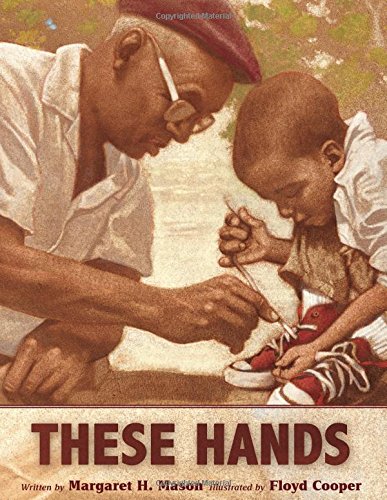These Hands (Golden Kite Honors (Awards)) / Margaret H. Mason
| List Price: | |
Our Price: $14.06 | |
|
For Bulk orders
| |
|
Used Book Price: $4.78 | |
| These Hands (Golden Kite Honors (Awards)) / Margaret H. Mason | |
| Publisher: HMH Books for Young Readers | |
| Availability:Usually ships in 24 hours | |
| Sales Rank: 1003249 | |
|
Similar Books

Not so long ago, during the 1950s and early 1960s, the African American workers at the Wonder Bread, Awrey, and Tastee bakery factories were allowed to sweep the floors, load the trucks, and fix the machines—but they were not allowed to work as bread dough mixers or bread dough handlers.
I learned this history from Joe Barnett, an old friend and leader of one of the bakery labor unions, which are groups of workers that join together to fight for fair treatment in their jobs. Joe told me the story one evening as we were driving to a Detroit Pistons basketball game, and I can still picture his hands gesturing, and trembling, in the crisscrossing glow of headlights. My husband, who is a labor union attorney, has also heard bakery union members talk many times over the years about these "unwritten rules" for African American workers.
A lot of what we know about how people were treated in the past comes through the retelling of stories like Joe’s, or "oral history." Fellow Michigan author Jean Alicia Elster remembers her mother telling her that African American women were not allowed to try on the hats in Hudson’s department store. The father of the first African American governor of New York, David Paterson, remembers being paid by the people he worked for to not attend holiday parties in the 1940s.
This history is shocking today to many people. But back in the 1940s and 1950s, it wasn’t news; it was just how things were. In fact, newspaper ads for jobs back then often mentioned "white only" or "no colored." Deciding what jobs people could do based on their skin color was not against the law until the Civil Rights Act was passed in 1964. Before then, people may have thought such behavior was wrong, but they couldn’t force other people to change.
One day in 2006, a few years after Joe died, I was watching my daughter play the violin and thinking about hands. I thought of Joe’s hands, and also of his heart. And I wrote down his story.
--Margaret H. MasonThe Process of Floyd Cooper, Illustrator of These Hands
(Click on Images to Enlarge)
 |  |
| My art begins as tiny, tiny little thumbnails drawn with a pencil on vellum. These thumbnails are resized to the trim size of the book. | A more precise sketch is done and text is pasted into place on the sketch. |
 |  |
| The sketch is transferred to the canvas and covered with a wash of thin paint. | The final image is "rendered" using erasers to subtract shapes. Color is glazed over these shapes in layers, ending in the final painting! |






